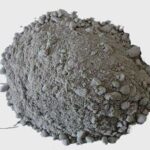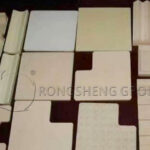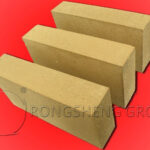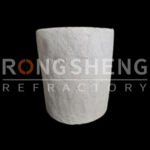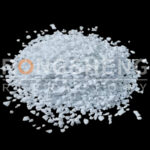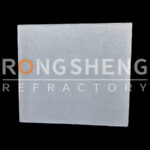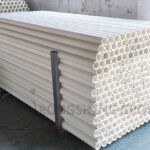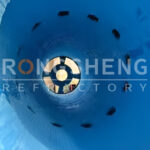Refractory Mortar Description
Refractory mortar can be divided into hydrous refractory mortar ( water containing chemical bonder) and non hydrous refractory mortar ( liquid organic bonder) by chemcial property. Refractory mortar can also be divided into acidic refractory mortar and basic refractory mortar by acid-base property.
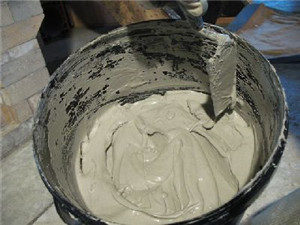
- Non hydrous refractory mortar
Hydrous refractory mortar is not suitable for the masonry of carbon bricks, as the vapor of hydrous mortar can damage the carbon masonry. Non hydrous aluminum silicate refractory mortar uses liquid organic bonder and non hydrous liquid alcohol to adjust the consistency. Non hydrous aluminum silicate refractory mortar is mainly used as masonry joint material for blast furnace hearth, furnish bash and so on.
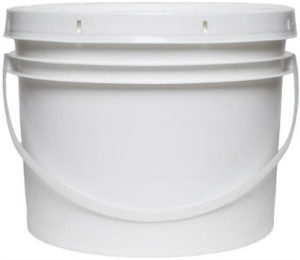
Non hydrous aluminum silicate refractory mortar Index
| Item | High alumina refractory mortar | Clay mortar | |
| Refractoriness℃ ≥ | 1770 | 1790 | 1750 |
| Cold crushing strength (1400℃,3h) MPa ≥ | 5.0 | 5.0 | 5.0 |
| Granularity ≥0.5mm % | ≤2 | ≤2 | ≤2 |
| Al2O3 %≥ | 50 | 50 | 50 |
- Basic refractory mortar
Basic refractory mortar is the joint material for the masonry of basic fire brick, including magnesia refractory mortar, magnesia alumina refractory mortar, magnesia chrome refractory mortar, magnesia silica refractory mortar and so on. Basic refractory mortar adopts sintered or fused magnesia sand, synthesized material, used magnesia bricks or magnesia chrome bricks as raw material, they are pulverized into powder and are mixed with bonder and additives.
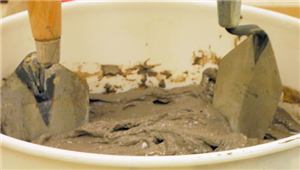
As basic refractory mortar contains MgO, which will produce Mg(OH)2 when contacts with water, and have volume expansion. When Mg(OH)2 are heated, dehydration can reproduce MgO. So hydrous basic refractory mortar will lose bonding strength due to volume expansion, it should use liquid chemical bonder which will react with MgO and produce composite salt or non hydrous organic bonder. Another thing to be mentioned is that basic refractory mortar can’t use acidic chemical bonder, because acid bonder can react with MgO quickly, which will lead to quick setting and lose workability.
Basic refractory mortar don’t have universal physicochemical index, should be prepared according to application requirement.
- Silicon carbide and carbon refractory mortar
Silicon carbide refractory mortar is used to mason silicon carbide refractory products, or carbon containing refractory products. Carbon based or carbon containing refractory mortar are mainly used as jointing or filling material for carbon bricks in large scale and middle scale blast furnace , for alumium carbon bricks in metal mixer or torpedo tank and so on. Silicon carbide and carbon mortar are also called carbon paste, can be divided into bold joint and thin joint.
Silicon carbide refractory mortar physicochemical Property
| Bonder | Silicate | Phosphate | Phenolic resin | |
| Modulus of rupture Mpa(1400℃, 3h) | 9.7 | 8.5 | 3.0 | |
| Bulk density(dry) g/cm3 | 1.96 | 1.77 | — | |
| Refractoriness under load ℃≥ | 1650 | 1650 | — | |
| Linear expansion rate % | 3.05*10-6 | — | — | |
| Cementation time /min | 1.8~3.5 | 1.3~3 | 2~5 | |
| SiC % | 76.0 | 86.2 | 78.7 | |
Refractory Material Professional Manufacturer & Supplier
Rongsheng kiln refractory manufacturer is a comprehensive enterprise in refractory material industry, high temperature fireproof products cover metallurgy, refractory building materials, electric power, chemical industry, etc. Hot sale products such as ceramic fiber refractory material, refractory bricks, castable, refractory cement, ramming mass and so on are exported to many countries in the world and highly appreciated by customers.
